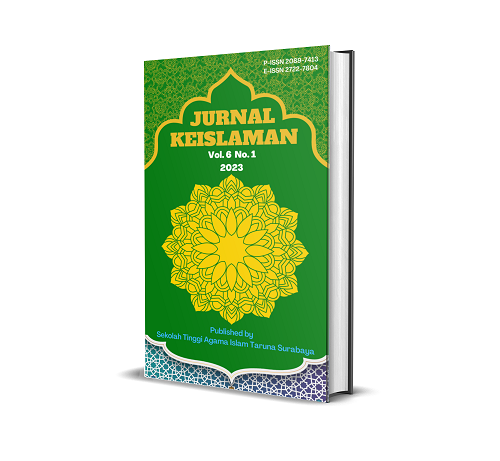Dilema Hukuman Mati: Komparasi Antara Konvenan International Terkait Hak Asasi Manusia dan Pandangan Nahdlatul Ulama
Abstract
The United Nations, through Resolution 77/2022 of the Global Moratorium on the Death Penalty, has encouraged world countries to postpone the death penalty because it is seen as a violation of Human Rights. In this article, the authors compare the arguments by the United Nations and human rights organizations in abolishing the death penalty with the religious views of the largest Muslim organization in Indonesia, Nahdlatul Ulama (NU). The research was conducted using qualitative methods, and data collection techniques were conducted through interviews with informants, namely several Nahdlatul Ulama women activists, as well as literature studies. NU generally approves of the death penalty for perpetrators of serious crimes, such as corruption and subversive acts that threaten national security, as long as there are solid and convincing evidences. NU stated that Islam recognizes the principle of human rights, but the death penalty can be applied to severe crimes to protect the security of the state and protect the right to life of more people. In this study, it was also found that Islamic law (in this case, the verses of the Quran) were in line with the Criminal Code and laws in Indonesia regarding the death penalty.References
Al-Thabarsi, Abu Ali bin al-Hasan, Majma' Al-Bayan fi Tafsir Al-Qur'an (Beirut: Dar Al-Kutub Al-Ilmiyah, 1997)
Asrori, Kajian Ma'anil Hadis tentang Hukuman Mati, Jurnal Al-Hikmah Vol XIV No.2 2018.
Al-Qurthûbi, Abu 'Abdillah Muhammad bin Ahmad, Al-Jami’ li Ahkam Al-Qur’an (Beirut: Muassasah Al-Risalah Al-Qurthubi, 2006)
Al-Razi, Fakhr Al-Din, Tafsir Al-Kabir, (Kairo: Dar al Hadits, 2012)
Alamsyah, Nur, Death Sentencing on Perspective Law and Human Rights. International Conference of ASEAN Prespective and Policy (ICAP), [S.l.], v. 1, n. 1, p. 31-35, oct. 2018. Available at: <https://jurnal.pancabudi.ac.id/index.php/ICAP/article/view/264>.
BBC. Pegiat HAM kecam eksekusi hukuman mati narkoba. https://www.bbc.com/indonesia/berita_indonesia/2015/01/150116_eksekusi_terpidana_narkoba diakses 8 Februari 2023.
Death Penalty Info. U.S. Votes No, as Record Number of Nations Adopt UN Resolution for Global Moratorium on the Death Penalty. https://deathpenaltyinfo.org/news/u-s-votes-no-as-record-number-of-nations-adopt-un-resolution-for-global-moratorium-on-the-death-penalty, diakses 8 Februari 2023
Death Penalty Info. Countries that have abolished the death penalties since 1976. https://deathpenaltyinfo.org/policy-issues/international/countries-that-have-abolished-the-death-penalty-since-1976 diakses 8 Februari 2023.
Dewi, Ni Komang Ratih Kumala, Keberadaan Pidana Mati Dalam Kitab Undang-Undang Hukum Pidana (KUHP). Jurnal Komunikasi Hukum (JKH) Universitas Pendidikan Ganesha. Vol. 6 No 1, Februari 2020
Ghawari, Miqdad bin Abdullah Suyuri Hilli Asadi, Kanz Al-Irfan fi Fiqh Al-Islam (Qom: Maktab Nawid Islam, 2001)
Hutapea, Bungasan, Kontroversi Penjatuhan Hukuman Mati Terhadap Tindak Pidana Narkotika dalam Perspektif Hukum dan Hak Asasi Manusia. (Jakarta: Badan Penelitian dan Pengembangan Hukum dan Hak Asasi Manusia Kementerian Hukum dan Hak Asasi Manusia RI).
HRW. Asian Nations Reject UN Vote Against Death Penalty https://www.hrw.org/news/2020/11/25/asian-nations-reject-un-vote-against-death-penalty diakses 8 Februari 2023.
Hutapea, Bungasan, Kontroversi Penjatuhan Hukuman Mati Terhadap Tindak Pidana Narkotika dalam Perspektif Hukum dan Hak Asasi Manusia. (Jakarta: Badan Penelitian dan Pengembangan Hukum dan Hak Asasi Manusia Kementerian Hukum dan Hak Asasi Manusia RI).
Kurniawan, Alhafiz, Putusan NU tentang Korupsi, Koruptor, dan Hukuman Mati, : https://islam.nu.or.id/syariah/putusan-nu-tentang-korupsi-koruptor-dan-hukuman-mati-lZTSS, accessed February 8, 2023.
OHCHR. Universal Declaration of Human Rights. https://www.ohchr.org/sites/default/files/UDHR/Documents/UDHR_Translations/eng.pdf diakses 8 Februari 2023.
Prokosch, Eric, Human Rights V. The Death Penalty Abolition and Restriction in Law and Practice. (Amnesty International, 1998) https://www.amnesty.org/en/wp-content/uploads/2021/06/act500131998en.pdf diakses 8 Februari 2023.
Prokosch, Eric, Human Rights V. The Death Penalty Abolition and Restriction in Law and Practice. (Amnesty International, 1998) https://www.amnesty.org/en/wp-content/uploads/2021/06/act500131998en.pdf diakses 8 Februari 2023.
PBB, Dokumen, https://documents-dds-ny.un.org/doc/UNDOC/GEN/N22/724/03/PDF/N2272403.pdf?OpenElement diakses 8 Februari 2023.
QS al-Baqarah [2]:178
QS al-Isra [17]:33
QS al-Maidah [5]:33
QS al-Maidah [5]:89
QS an-Nisa [4]:90
QS al-Ahzab [33]:60-61
Totomutu, Christofel Brayn Leonard., Sugiartha, I Nyoman Gede., and Widyantara, I Made Minggu, Hukuman Mati Dalam Tindak Pidana Narkotika Ditinjau Dari Perspektif Hak Asasi Manusia (Studi Putusan Mahkamah Konstitusi Nomor 2-3/Puu-V/2007). Jurnal Konstruksi Hukum, Vol. 2, No. 2, Mei 2021
UN Press. Missing Persons, Extrajudicial Executions, Death Penalty Moratorium among Rights Questions of Six Draft Resolutions Approved by Third Committee. https://press.un.org/en/2022/gashc4367.doc.htm, diakses 8 Februari 2023
Copyright (c) 2023 Kiagus Zaenal Mubarok, Dina Yulianti, Otong Sulaeman

This work is licensed under a Creative Commons Attribution-ShareAlike 4.0 International License.
Authors who publish with this journal agree to the following terms:
- Authors retain copyright and grant the journal right of first publication with the work simultaneously licensed under a Creative Commons Attribution-ShareAlike that allows others to share the work with an acknowledgement of the work's authorship and initial publication in this journal.
- Authors are able to enter into separate, additional contractual arrangements for the non-exclusive distribution of the journal's published version of the work (e.g., post it to an institutional repository or publish it in a book), with an acknowledgement of its initial publication in this journal.
- Authors are permitted and encouraged to post their work online (e.g., in institutional repositories or on their website) prior to and during the submission process, as it can lead to productive exchanges, as well as earlier and greater citation of published work (See The Effect of Open Access).






















